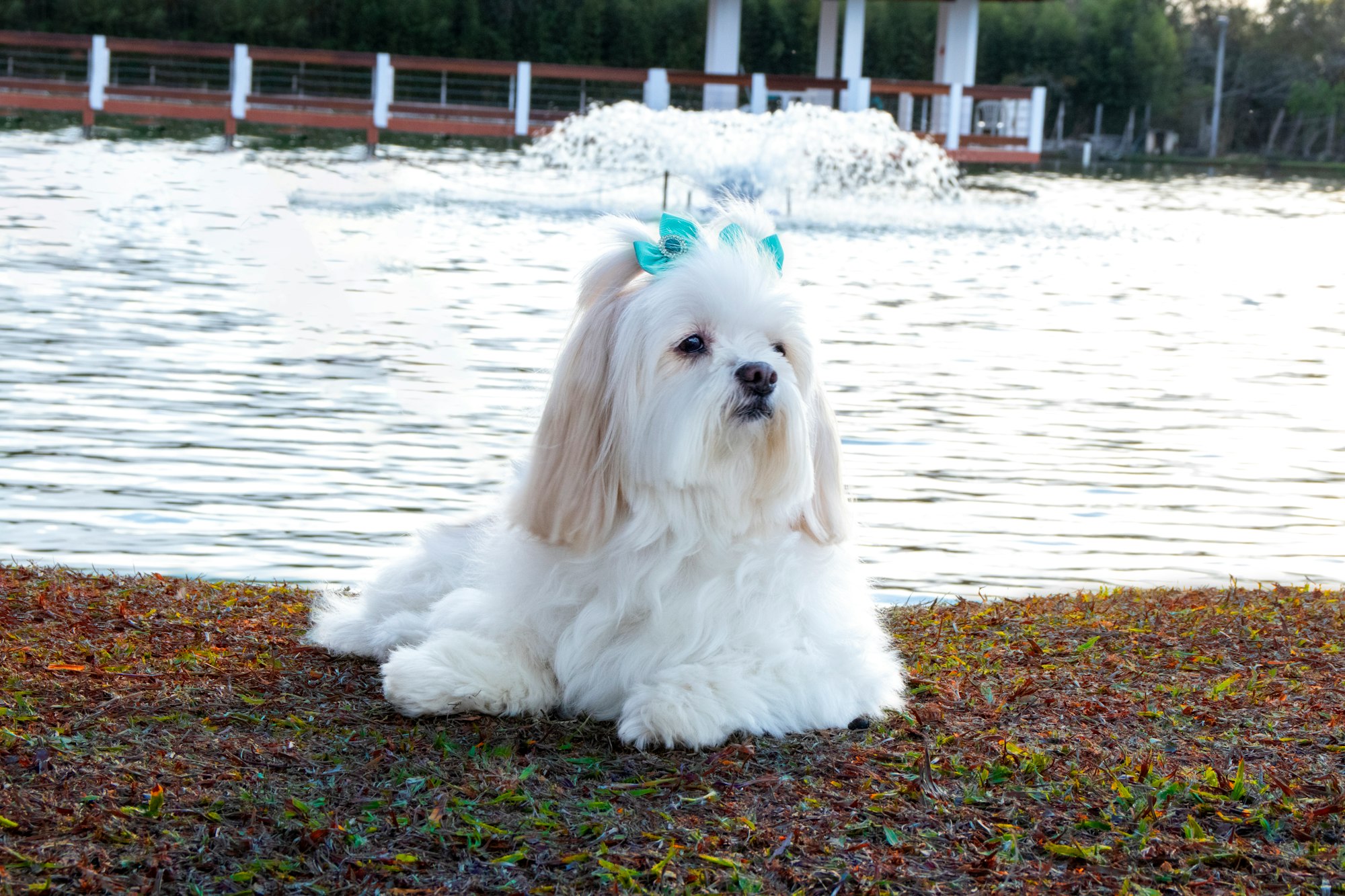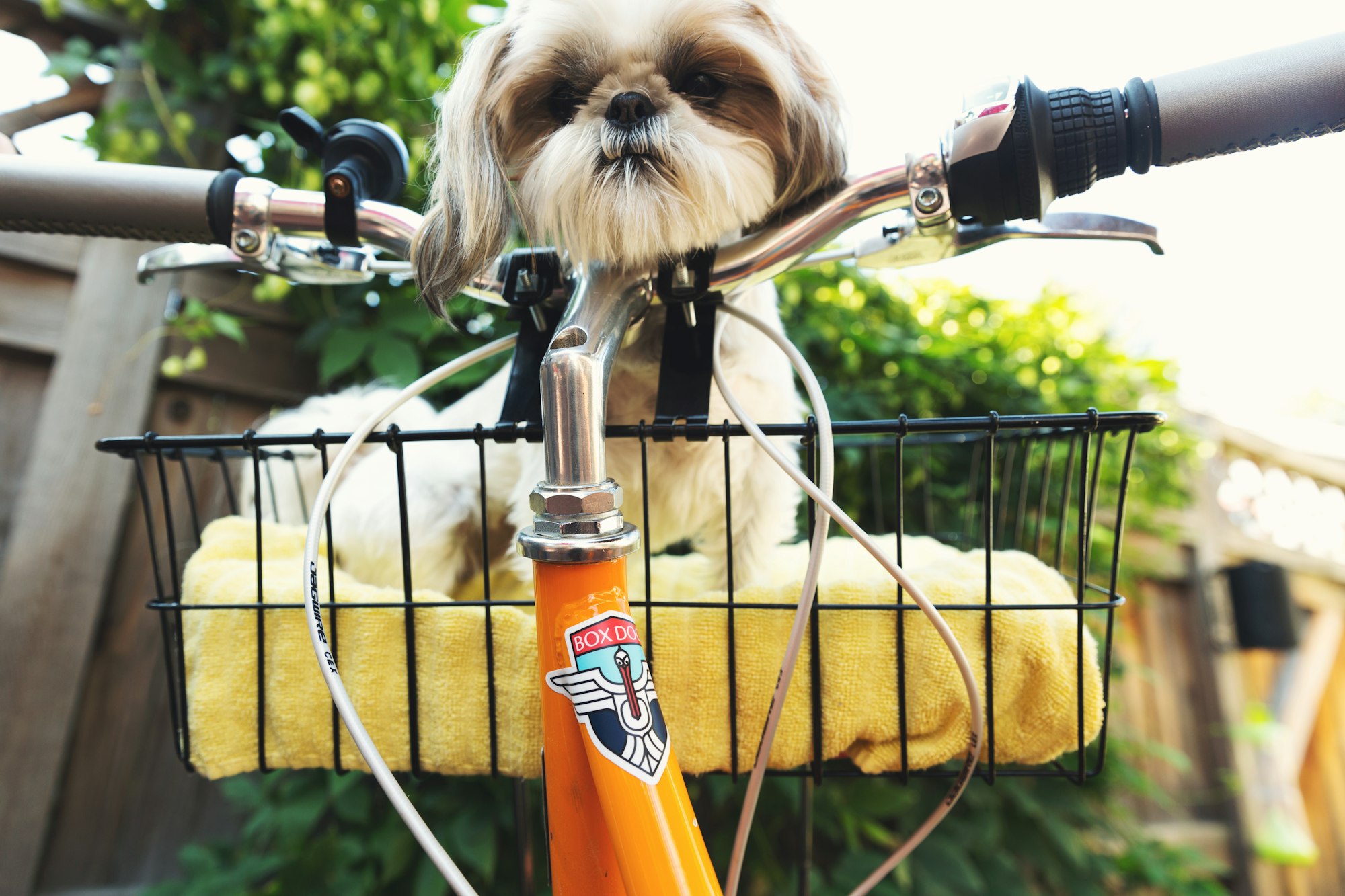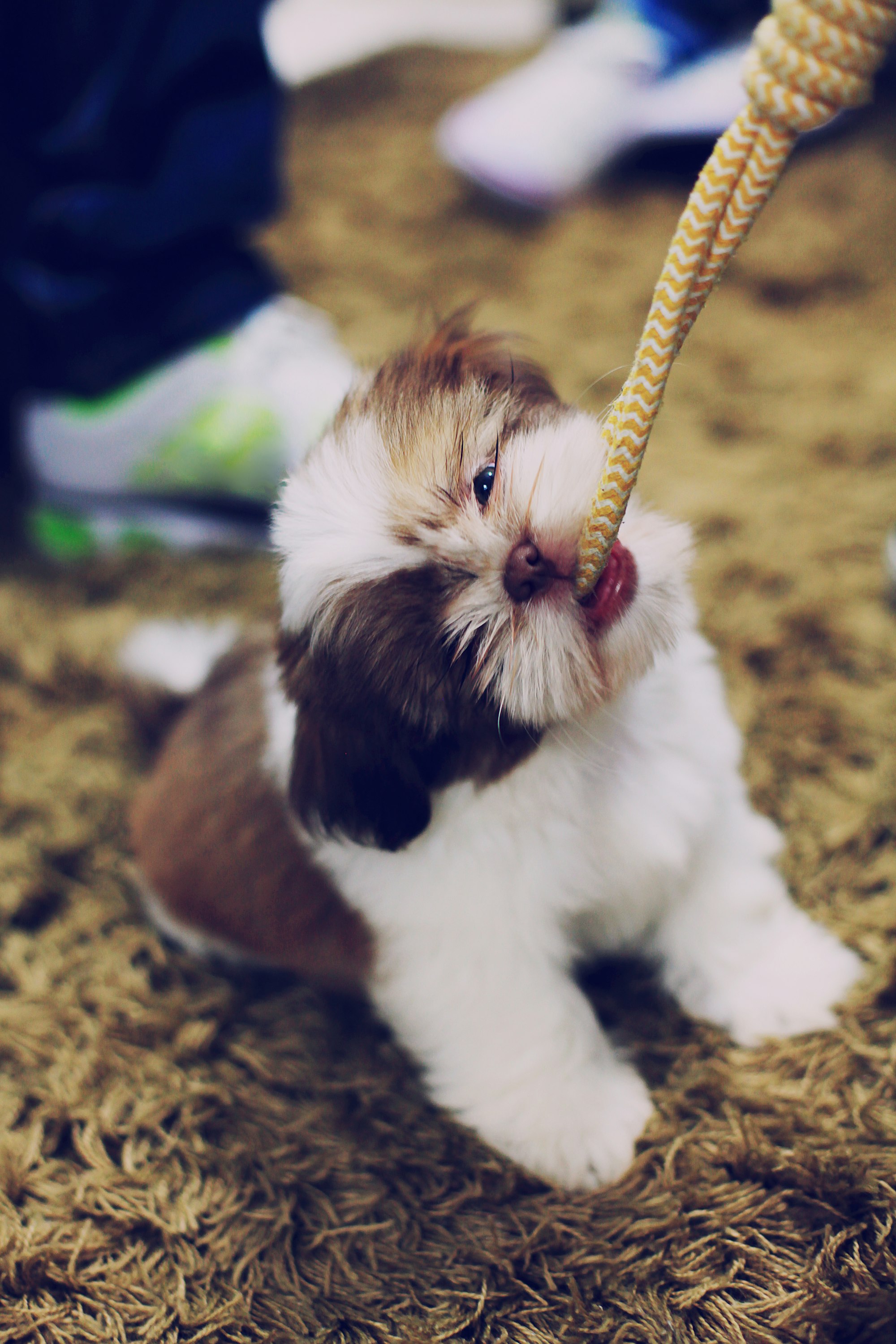Are you ready to explore the captivating world of Lhasa Apsos? These graceful and dignified canine companions have a rich heritage that dates back centuries. Originating from the mystical lands of Tibet, Lhasa Apsos are renowned for their elegant appearance, loyal nature, and distinctive long coat. In this article, we'll delve into the history, characteristics, care, and benefits of having a Lhasa Apso as your cherished companion. Join us as we embark on a journey to uncover the captivating essence of these enchanting dogs.

A Glimpse into the History of Lhasa Apsos
Lhasa Apsos have a storied history that stretches back over a thousand years. Bred as sentinel dogs for Tibetan monasteries and palaces, these regal canines were considered sacred and were believed to bring good luck. Their name "Lhasa Apso" is derived from "Lhasa," the capital of Tibet, and "apso," which translates to "bearded" in Tibetan, referring to their luxurious facial hair.
The Allure of Lhasa Apsos: Characteristics That Captivate
Lhasa Apsos possess a unique combination of traits that make them truly captivating companions:

- Elegant Appearance: With their long, flowing coat and distinctive mane-like hair on the head, Lhasa Apsos exude an air of elegance and grace.
- Loyal Nature: Lhasa Apsos form deep bonds with their human companions and are known for their unwavering loyalty and protective instincts.
- Intelligent and Independent: These dogs are intelligent thinkers with an independent streak. Their intelligence can sometimes manifest as a bit of stubbornness.
- Alert Watchdogs: Rooted in their history as sentinel dogs, Lhasa Apsos have keen senses and make excellent watchdogs, alerting their owners to potential dangers.
Weight and Height
Average Weight of a Lhasa Apso
The average weight of a Lhasa Apso typically falls within the range of 12 to 18 pounds (5.4 to 8.2 kilograms). This compact weight range makes them a manageable and portable companion, ideal for families and individuals alike.
Several factors can influence the weight of a Lhasa Apso, including genetics, diet, exercise level, and overall health. While the breed has a general weight range, individual dogs may fall outside this range due to these variables.
Ideal Height of a Lhasa Apso
In terms of height, Lhasa Apsos typically stand around 9 to 11 inches (22.9 to 27.9 centimeters) at the shoulder. Their sturdy and well-proportioned build contributes to their graceful and regal appearance.
Personality Traits
Lhasa Apsos possess a unique blend of personality traits that make them truly endearing companions:
- Loyalty: Lhasa Apsos form deep and unwavering bonds with their families, often demonstrating remarkable loyalty that endears them to everyone around.
- Affectionate Nature: Despite their regal appearance, Lhasa Apsos have a heartwarming affectionate side, enjoying cuddles and close companionship with their owners.
- Playful Spirit: Their playful antics and lively demeanor add an element of joy to any household, making them a delight to be around.
- Alertness: Lhasa Apsos possess a keen sense of alertness, often acting as vigilant watchdogs, notifying their families of any approaching visitors.
- Independence: While affectionate, Lhasa Apsos also have a streak of independence, making them intriguing and well-rounded companions.
Lhasa Apso's Compatibility with Families

The Lhasa Apso's versatile nature makes them highly compatible with various family dynamics:
- Adaptability: The Lhasa Apso fits right in whether you're a single individual or part of a bustling family.
- Apartment Living: Their adaptability and moderate size make them suitable for apartment living.
- Interaction with Children: Lhasa Apsos interact well with children, provided they undergo early socialization and supervised playtime.
Essential Care and Grooming
Grooming is an essential part of keeping your Lhasa Apso healthy and happy. This stepwise guide will help you establish a comprehensive grooming routine that ensures your furry friend's well-being.
- 1. Understanding the Double Coat
Learn about your Lhasa Apso's unique double coat, which provides protection and insulation. This understanding will guide you in caring for their coat and preventing matting.
- 2. Brushing Basics for Coat Health
Regular brushing is key to maintaining a healthy coat. Choose the right brush and follow proper brushing techniques to prevent tangles and keep their fur shiny.
- 3. Bathing: Keeping Your Lhasa Apso Clean
Discover the appropriate bathing frequency for your Lhasa Apso and gather the necessary supplies. Follow a step-by-step bathing process to ensure their coat and skin remain clean and healthy.
- 4. Ear Care: Preventing Infections
Learn how to inspect and clean your Lhasa Apso's ears to prevent infections and discomfort. Proper ear care is essential for their overall well-being.
- 5. Eye Care: Bright Eyes and Clear Vision
Master the art of gentle eye cleaning to prevent tear staining and ensure your Lhasa Apso's eyes remain bright and healthy.
- 6. Nail Trimming: Comfort and Safety
Discover the proper technique for trimming your Lhasa Apso's nails, ensuring their comfort and preventing overgrowth-related issues.
- 7. Dental Hygiene: A Breath of Fresh Air
Learn the importance of dental care and how to brush your Lhasa Apso's teeth effectively. Good oral hygiene contributes to their overall health.
- 8. Regular Check-ups for Overall Well-being
Understand the significance of regular grooming sessions as opportunities to check for any health concerns or abnormalities. This step promotes holistic well-being.
- 9. Creating a Positive Grooming Experience
Make grooming a positive and enjoyable experience for your Lhasa Apso by using treats, praise, and patience. This step enhances their comfort and trust.
- 10. Seeking Professional Grooming Help
Know when it's best to seek assistance from a professional groomer for tasks such as intricate haircuts or challenging grooming areas.
By following this stepwise guide to essential care and grooming, you'll provide your Lhasa Apso with the attention and love they deserve. Your dedication will result in a beautiful, healthy, and content companion that enriches your life every day.
Training Your Lhasa Apso: Tips and Tricks
Effective training methods can bring out the best in your Lhasa Apso:
- Positive Reinforcement: Use positive reinforcement techniques, such as treats and praise, to encourage desired behaviors.
- Consistency: Consistent training sessions help reinforce commands and behaviors.
- Socialization: Early socialization exposes them to various people, pets, and environments, promoting confidence.
Caring for Your Lhasa Apso: Tips for a Happy Companion
Caring for a Lhasa Apso requires attention to their specific needs to ensure they lead a healthy and contented life:
Exercise:
- Lhasa Apsos benefit from daily walks and playtime, though their exercise needs are moderate compared to more active breeds.
Training:
- Begin training early to establish a respectful and obedient relationship.
- Use positive reinforcement methods to motivate your Lhasa Apso during training sessions.
Socialization:
- Introduce your Lhasa Apso to various people, pets, and environments to prevent shyness or aggressive behavior.
Lhasa Apso Health Issues
Lhasa Apsos, with their regal appearance and charming personalities, are generally healthy dogs. However, it's important to be aware of potential health concerns that can affect the breed. Regular veterinary care, a balanced diet, and proper grooming are essential components of maintaining their overall well-being.
1. Hereditary Eye Issues
Lhasa Apsos are known for their distinctive eyes, but they can be prone to certain hereditary eye conditions. Progressive Retinal Atrophy (PRA) and cataracts are among the concerns that can affect their vision. Regular eye examinations by a veterinarian can help detect and manage these issues.
2. Orthopedic Conditions
Like many small breeds, Lhasa Apsos can be susceptible to orthopedic conditions such as patellar luxation and hip dysplasia. Providing joint supplements, maintaining a healthy weight, and engaging in moderate exercise can help prevent or manage these issues.
3. Skin Allergies and Sensitivities
Lhasa Apsos' luxurious coat can sometimes lead to skin allergies or sensitivities. Regular grooming, including brushing and proper hygiene, can help prevent skin issues. If you notice excessive itching, redness, or hair loss, consult your veterinarian.
4. Dental Health Challenges
Small breeds like Lhasa Apsos can be prone to dental problems such as periodontal disease and tooth decay. Regular teeth brushing, dental chews, and professional cleanings can help maintain their oral health.
5. Respiratory Concerns
Their flat faces, while adorable, can lead to respiratory issues known as brachycephalic syndrome. Be cautious of hot or humid conditions and avoid vigorous exercise during peak temperatures to prevent overheating.
6. Nutritional Considerations
Providing a balanced and nutritious diet is crucial for your Lhasa Apso's overall health. Consult with your veterinarian to determine the best diet for their age, activity level, and specific health needs.
7. Regular Veterinary Check-ups
Regular visits to the veterinarian are essential to monitor your Lhasa Apso's health and address any potential concerns promptly. Routine vaccinations, wellness exams, and preventive care are crucial for maintaining their well-being.
8. Grooming and Hygiene Practices
Regular grooming is not only essential for keeping their coat looking pristine but also for maintaining their skin health. Clean their ears, trim their nails, and brush their teeth regularly to prevent potential health issues.
9. Active Lifestyle and Mental Stimulation
Keeping your Lhasa Apso mentally and physically engaged can contribute to their overall well-being. Daily exercise, interactive play, and mental stimulation through puzzle toys and training can help keep them happy and healthy.

While Lhasa Apsos can face certain health concerns, being proactive in their care can help prevent or manage potential issues. Regular veterinary visits, a balanced diet, proper grooming, and providing a loving and enriching environment all contribute to the overall health and happiness of your cherished Lhasa Apso companion.
Embracing the Lhasa Apso Lifestyle: Benefits for Owners
Owning a Lhasa Apso offers a host of benefits that contribute to a rewarding companionship:
- Loyal and Loving: Lhasa Apsos form deep bonds with their owners, offering unwavering companionship and affection.
- Low Shedding: While their coat requires maintenance, Lhasa Apsos are considered hypoallergenic and produce minimal allergens.
- Apartment Friendly: Their moderate size and exercise needs make Lhasa Apsos suitable for apartment living.
- Guardianship: Lhasa Apsos' alertness and protective nature make them excellent watchdogs.

Lhasa Apso Price
The price of a Lhasa Apso can vary widely, with factors such as breeder reputation, location, lineage, and demand all playing a role in determining the cost. It's important to research and understand the potential range before making a decision.
On average, a Lhasa Apso puppy can range from $500 to $2,000 or more. Remember that prices outside this range may indicate red flags, such as potential health or ethical concerns.
Factors Influencing Lhasa Apso Pricing
Several key factors can influence the price of a Lhasa Apso:
- Breeder Reputation: Established and reputable breeders who prioritize the health and well-being of their dogs often charge higher prices.
- Lineage and Pedigree: Lhasa Apsos with impressive pedigrees and show-quality lineage may come with a higher price tag.
- Location: Prices can vary based on geographic location and demand. Urban areas or regions with a higher cost of living may have higher prices.
- Health Screening and Care: Breeders who invest in comprehensive health screening, vaccinations, and proper care may charge more for their puppies.
Reputable Breeders vs. Other Sources
When considering where to purchase a Lhasa Apso, it's advisable to choose a reputable breeder. While prices from breeders may be higher, you're more likely to receive a healthy and well-socialized puppy with proper documentation.
Additional Costs of Lhasa Apso Ownership
Beyond the initial purchase price, there are additional costs associated with Lhasa Apso ownership:
- Veterinary Care: Regular check-ups, vaccinations, and potential medical expenses should be factored into your budget.
- Grooming: Lhasa Apsos require regular grooming to maintain their luxurious coat.
- Food and Supplies: High-quality dog food, treats, interactive dog toys, and other essentials contribute to ongoing costs.
- Training and Socialization: Proper training and socialization may involve expenses such as obedience classes.
Budgeting for Your New Furry Family Member
Before bringing a Lhasa Apso into your home, it's essential to create a realistic budget that encompasses all potential costs. This ensures you can provide the best care for your new furry family member.
Rescuing or Adopting a Lhasa Apso
If you're open to adopting, rescuing a Lhasa Apso from a shelter or rescue organization can be a rewarding option. Adoption fees are generally lower than purchasing from a breeder, and you're providing a loving home to a happy dog in need.
Conclusion
Lhasa Apsos, with their rich history and captivating traits, bring a touch of elegance and loyalty to the lives of their owners. By understanding their unique needs and embracing their companionship, you can enjoy a fulfilling journey with these dignified and enchanting canine friends.
FAQs
- Q1: Are Lhasa Apsos good with children?
Yes, Lhasa Apsos can be good with children when properly socialized and supervised. Early introductions are essential.
- Q2: How often should I groom my Lhasa Apso?
Regular grooming, including brushing and occasional baths, helps maintain their coat's health and appearance.
- Q3: Do Lhasa Apsos get along with other pets?
Lhasa Apsos can get along with other pets if introduced properly and given ample socialization.
- Q4: Are Lhasa Apsos high-maintenance dogs?
While they require regular grooming, Lhasa Apsos are generally moderate in terms of exercise and care needs.
- Q5: What is the average lifespan of a Lhasa Apso?
Lhasa Apsos typically live between 12 to 15 years, provided they receive proper care and attention.
Embrace the elegance and loyalty of Lhasa Apsos by making them a cherished part of your family.






